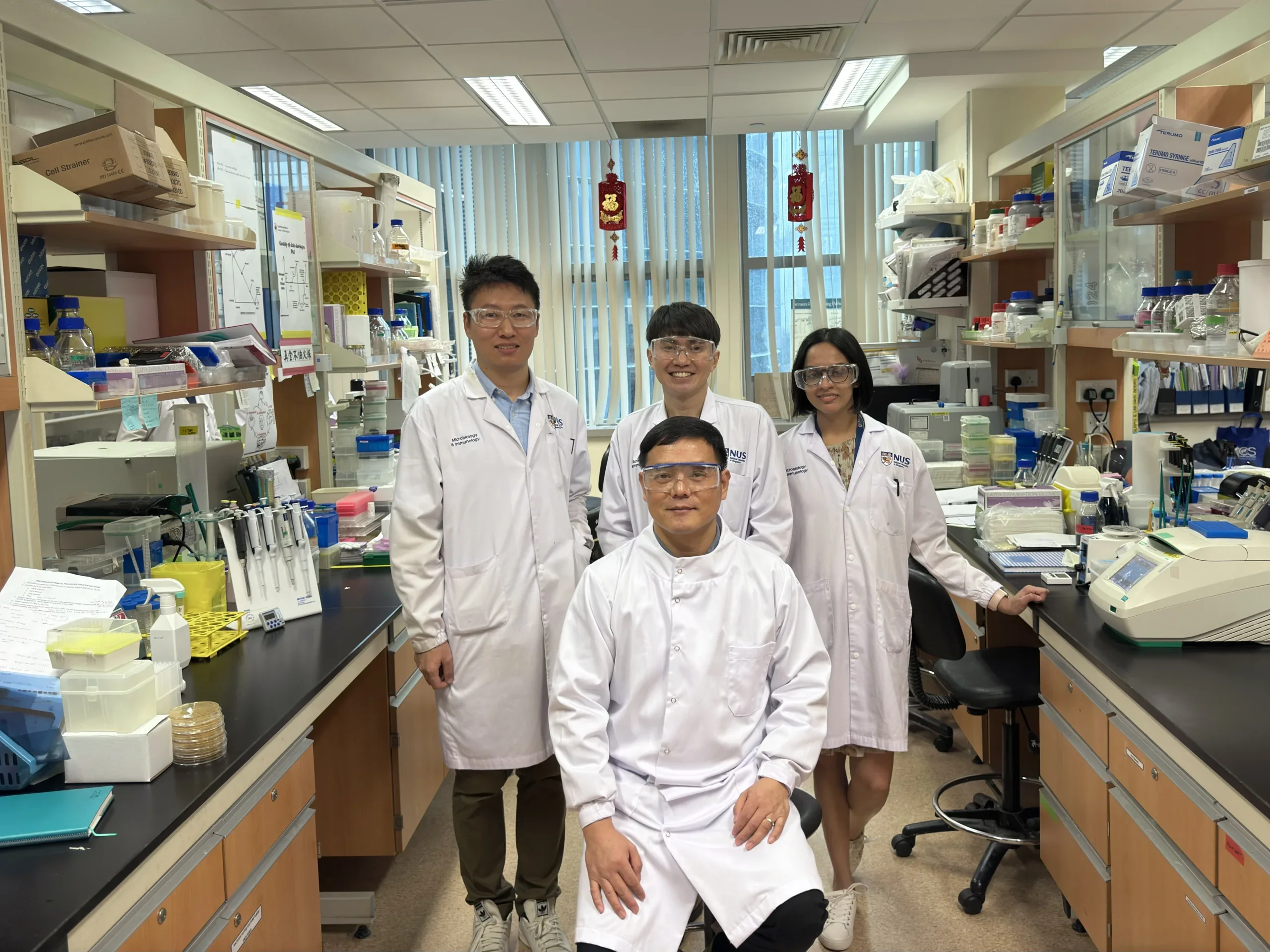NUS Medicine study discovers potential for new colorectal cancer treatment
Published: 15 Jan 2025

Front: Associate Professor Zhang Yongliang. Back L to R: Dr Li Heng, Dr Png Chin Wen, Ms Madhushane.
Colorectal cancer (CRC) is a type of cancer that begins in the colon (large intestine) or rectum, which are parts of the digestive system. It typically starts as abnormal growths called polyps that form in the lining of the colon or rectum. Over time, some of these polyps can become cancerous if left untreated. CRC is one of the most common cancers in Singapore, with an average of about 2,540 cases a year, and it is also one of the top cancers contributing to cancer mortality in Singapore. It is the third most common cancer worldwide, accounting for approximately 10% of all cancer cases according to the reports from World Health Organization (WHO). Issues including cancer recurrence and development of drug resistance pose a significant challenge in CRC treatment, highlighting the need for new therapeutic methods.
Researchers from the Yong Loo Lin School of Medicine, National University of Singapore (NUS Medicine) have made a discovery that could change how CRC is treated. Their study, published in Nature Communications, has revealed that a molecule called Dual-Specificity Phosphatase 6 (DUSP6) plays a major role in helping CRC grow. The CRC cells with higher DUSP6 tested in this study proliferate approximately 40% more than those with lower DUSP6 levels. In patients with CRC, elevated DUSP6 levels are associated with a poorer prognosis and decreased survival compared to patients with lower DUSP6 levels (p value = 0.029).
DUSP6 is a type of protein called a phosphatase that acts like a “switch-off” mechanism for specific signalling pathways inside cells. Its main function is to control the ERK1/2 MAPK pathway, which is important for cell growth, survival, and repair. Under normal circumstances, DUSP6 deactivates ERK1/2, preventing excessive cell growth or signalling. In some cancers, such as lung and skin cancers, DUSP6 acts as a tumour suppressor, helping to stop cancer growth. In other cancers however, such as CRC, DUSP6 has the opposite effect and promotes tumour growth.
The research was led by Associate Professor Zhang Yongliang, from the Department of Microbiology & Immunology, and Immunology Translational Research Programme (TRP), NUS Medicine. A/Prof Zhang said, “In CRC, higher levels of DUSP6 have been found in tumours, where it helps cancer cells grow faster, spread more easily, and leads to poorer outcomes for patients. This unexpected role highlights why DUSP6 is now seen as a possible target for new treatments. Our research not only explains why some colon cancers are so aggressive, but also gives us a clear target to develop new treatments.”
The study found that DUSP6 protects cancer cells by inhibiting a process that normally destroys a key growth protein called Notch1—a protein that acts like a cellular communicator, helping cells decide what to do, such as grow, divide, or take on specific roles. It is part of the Notch signalling pathway, which is crucial during early development and in maintaining healthy tissues. Notch1 becomes active when it interacts with specific proteins on neighbouring cells. This triggers a series of “cuts” in the protein, releasing the Notch1 intracellular domain (NICD). NICD travels to the nucleus, where it switches on genes that drive cell growth, division, and survival. When Notch1 is overactive or stabilised, it can cause uncontrolled cell growth and contribute to cancer. In CRC, high levels of active Notch1 are linked to a poorer prognosis because it drives tumour growth and helps cancer cells survive longer. To keep Notch1 activity in check, it must be phosphorylated (marked for destruction) and broken down by the cell’s “recycling system.” If this balance is disrupted, Notch1 can remain active for too long and promote cancer growth.
Associate Professor Veronique Angeli, Director of the Immunology TRP at NUS Medicine, and from the Department of Microbiology & Immunology, added, “In simpler terms, DUSP6 acts like a protector/controller for Notch1, stopping it from being broken down and allowing it to stay active for longer than it should. This leads to increased tumour cell growth, faster spread of cancer cells, and worse survival outcomes for patients with CRC.”
The possibility of a new therapy for CRC could be achieved by blocking DUSP6. In laboratory models, researchers were able to significantly slow down tumour growth through blocking the protein. High levels of DUSP6 are linked to worse survival, so it could also be used to predict how aggressive a patient’s cancer might be. While the study focused on CRC, the findings could also help in other cancers where DUSP6 plays a role.
The team will be looking at research to further understand the pathogenesis of CRC, and to develop DUSP6 targeted therapies for treatment of the cancer, to improve health outcomes for patients.
This research is supported by the National Research Foundation, Singapore under the National Medical Research Council (NMRC) Open Fund – Individual Research Grant (MOH-001218) and administered by the Singapore Ministry of Health through the NMRC Office, MOH Holdings Pte Ltd, and the National University Health System of Singapore (NUHSRO/2021/110/T1/Seed-Sep/03 to C.W.P.)
Read more in the press release here.

